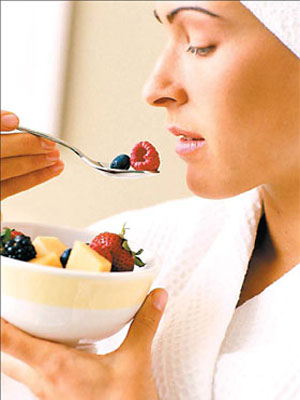Do you put on more weight when you eat late at night?
Most of us know strict dieters who eschew food in the hours just before bedtime, thinking that any calories they consume in the evening will count more. They usually cite the "fact" that a person's metabolism slows down significantly in the evening, or that no one burns calories in the middle of the night.
But in reality, a calorie at noon is really no different from a calorie at midnight.
The reason this myth is so widespread may have something to do with skewed perceptions. Many people who eat at night do so after skimping all day, leaving them with a ravenous nocturnal appetite. When they finally get around to eating, they are prone to grabbing the first thing in sight, which is likely to be something quick and easy, such as fast food.
Does drinking milk make you phlegmy?
Most people believe that milk causes excess mucus and as a result should always be avoided during a cold, but this is plain wrong. What can seem like an increase in mucus after drinking milk is just a slight thickening of your saliva.
A team of Australian researchers weighed the nasal secretions of dozens of people who volunteered to have cold viruses squirted up their noses. For 10 days, the scientists followed the subjects, keeping track of how much milk they drank and how much mucus they produced. They found no connection between milk intake, nasal secretions and congestion.
Other studies that examined whether asthmatics or people suffering from a cold produce more mucus after a glass of milk also found no difference.
Are those white spots on your fingernails a sign that you need more calcium?
More often than not, the white spots - or leukonychia - are caused by mild trauma to the base of the nail plate, usually from a hard knock or blow to the fingers. A rough manicure that puts a lot of pressure on the nails, an allergic reaction to nail enamels, and bacterial and fungal infections can also be the culprit.
The white color that you see is usually one of two things: trapped air or a structural defect in the nail itself. It takes more than eight months for a fingernail to grow out, so if you see a white spot halfway up your nail it means the damage occurred within the last four months.
Do wounds heal better when they are allowed to breathe and scab up?
Researchers have discovered that exposing a wound to the air is a terrible mistake because it creates a dry environment that promotes cell death.
A handful of studies have found that when wounds are kept moist and covered, blood vessels regenerate faster and the number of cells that cause inflammation drop more rapidly than they do in wounds allowed to air out. Today's best medical advice: Keep a wound moist and covered for at least five days.
A plaster wards off infection, keeps the wound moist and protects the area from sunlight, which stimulates the production of pigment and can cause discoloration.
Do you need less sleep as you get older?
It is well known that older people are typically early to bed, early to rise, and studies show that the average person spends about two fewer hours in bed each night aged 70 than they did aged 30.
Conventional wisdom is that older people just don't need as much sleep, but research suggests that is not the case.
What happens instead is that the composition of sleep changes, as people gradually spend less and less time in the deep, restorative stages of sleep. The duration of the REM phase, the stage in which we dream and our muscles relax most completely, diminishes markedly with age, as do the phases of sleep that are the deepest and most refreshing, stages three and four. In people who are older than 90, in fact, stages three and four may even disappear for good.
Meanwhile, stage one of the sleep cycle, the phase that constitutes light sleep, increases. That means there's a greater likelihood of being easily awakened by noise or something as minor as the person lying next to you rolling over.
The elderly are also more likely to have their sleep disturbed by pain, chronic illness, drug side effects, the need to use the bathroom or some other physiological discomfort. As a result, they end up with fewer hours of sleep each night - and subsequently need to make up for that loss during the day.
Is breakfast really the most important meal of the day?
People who eat a normal breakfast each morning - usually consisting of fiber and a protein source such as eggs, meat or soya - have been shown in repeated studies to be healthier than those who do not.
The most immediate benefits from breakfast are increased energy levels and a better ability to concentrate during the day.
It is also clear that eating breakfast can help ward off disease. In a study at Harvard Medical School, researchers tracked thousands of people and found that those who ate breakfast every day were far less likely to be obese than those who skipped it.
Again, part of the reason is that people who skimp on meals in the morning - whether for lack of time or in the hope of losing weight - tend to compensate by gorging later in the day, often on junk food.
For many people, breakfast is also the greatest source in their diet of wholegrain foods, which are associated with better health and a longer life span.
Studies show that people who eat breakfast each morning are healthier than those who do not (photo: China Daily).
(Agencies via China Daily December 12, 2007)


